Preface:
In our youth, the squabbles between my brother and I resulted in lots of bumps, bruises, mercurochrome, and a bandaid. Things got more serious when barbed wire fences and pitch forks were involved with our squabbles. Originally, these were two separate stories but in 2016 I have combined them into one story for the web world.
Stitches and Gett’n Even
 Stitches
Stitches
My brother and I grew up on a central Iowa farm in the ‘50s and early ‘60s. Our father thought if he worked us hard enough we would be too tired to get into trouble. Sometimes it worked for me but seldom worked for my brother. We still found time to have fun, fight with each other, and get into trouble. Gale was two years younger. He was physically smaller and a lot quicker. When we fought with each other, he could always escape. He could run faster and slip through places I couldn’t.
When Gale turned ten, he also joined 4-H, and we raised hogs. After we showed our hogs at the 4-H fair, we sold them. The check was more money than the two of us had ever seen. We wanted to buy bicycles. Dad said we would have to buy one together as there wasn’t enough money for two bicycles. Dad took us to the Gambles store in town. We picked out a bright red 24 inch bike. We paid for it with cash and counted out the $44 to the store owner. In the ‘50s we paid cash for everything we bought. If we didn’t have the cash, we didn’t buy it. Simple but effective economics. We proudly took the bike home and showed it to our mother.
Since this was our first bike, Dad insisted we leave the training wheels on it. We quickly learned to keep our balance, and in a few days the training wheels came off the bike. Sharing the bike went better than we expected. Gale and I had a well deserved reputation for fighting with each other. Later in life I heard stories about the fights between my Dad and his brother. Gale and I couldn’t help it; it was in the genes. However, we had few fights about the bike.
A few weeks later we bounded off the school bus and headed for the back door of the house, the only door we used. Leaning against the well house, by the back door, was another bike; a larger bike. The 26 inch bike was green, and it had an electric 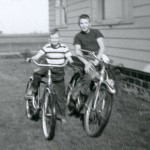
The electric horn didn’t work, but I scratched the corrosion off the contacts, and it would work most of the time. The two bikes were different sizes and different colors, but Gale and I decided we needed to add stuff to make sure we could tell them apart. We added handle grips with streamers. We clipped playing cards to the fender frames with clothes pins. The faster we pedaled, the more noise the cards made as the wheel spokes clipped each card. We loved it and the livestock learned to live with it. We added horns, lights, reflectors, and all the stuff we could pay cash for. It took a while on an allowance of a dollar a week.
It wasn’t long before we were racing each other. One great use for the bikes was to ride out to the pastures. We had pastures for the hogs, and we would ride out to water and feed them. We had cattle and cows and we would ride out to the pastures to herd them back to the barn. The lane to the pastures went past mom’s garden and made a ninety degree turn and headed west along the highway. There was enough room in the lane for the two of us to ride, or race, side by side.
When we had time, we would go down the lane and race each other back to the house. We usually went down to the corner of the gravel road and the highway. A woven wire fence was on both sides of the lane from our start line to the 90 degree corner by mom’s garden. The fence along mom’s garden was steel posts with two strands of barb wire. One strand was about a foot off the ground and the other strand was about waist high.
One day we were racing. Gale was always faster. I always blamed it on the bigger bike and bigger tires. The fact that I weighed a lot more than he did never enter into my logic for being slower. That day we raced several times. We took turns with the inside path and the outside path. It was always a 1, 2, 3, go. The winner was the first one to the gate by mom’s garden. Whether on the inside path or outside path Gale always won.
After a few races, I developed a new strategy. The 90 degree corner was always a tight place when both of us tried to navigate it at the same time. Whoever got around the corner first would win the race. I would try really hard to keep up with Gale going into the corner. I would take the inside path. At the corner, I would use my large bike and larger size to crowd him near the barb wire fence. He would stop, and I would win.
I was confident of this strategy because both of us had unpleasant experiences with barb wire fences. On rainy days, one of dad’s favorite jobs was building or repairing fences. Both of us had been poked, scratched, cut, or shocked by barb wire. Shocked because many of our barb wire fences were electrified to help keep the cattle and hogs inside the fences. Gale would stop instead of risking getting hurt by the barbed wire.
It was a hot summer day, and I was in a rolling sweat; nothing new for me. I sweat profusely. I could get into a sweat carrying water to the hogs at 20 below zero. With a 1, 2, 3, go, we were off. I was pedaling as hard as I could. I was huffing and puffing, but I was keeping up with my light weight brother on his smaller bike. We had passed the wet spot in the lane and starting the up hill run. We were still side by side, and the corner was getting closer. Slowly I edged to the right crowding Gale, but he didn’t want to budge. He could be stubborn. I always thought he was more stubborn than me. Later in life our wife’s would debate that point many times and decide it was a draw.
I was pedaling as fast as I could, and the corner was fast approaching. I edged to the right a little more. Our bikes are bumping each other. Size and mass does have its advantages, and I didn’t back off. Gale was forced to the outside. We were neck and neck as we enter the corner. Halfway through the corner the barb wire is fast approaching Gale. I expect him to hit the brakes at any moment. Being stubborn, he doesn’t do that. He chooses to take his chances with the barb wire and win the race.
The next thing I hear is a scream and Gale falls off his bike. I slam on my brakes and run back to him. His pant leg is torn open, and there is this ugly cut on his thigh. I had seen a lot of cuts, but this one was different. It was long and deep but there was little bleeding. There was this funny yellow stuff I had never seen in a cut before. It looked like yellow cottage cheese. I knew this was not good.
I yelled for my dad and started running toward the machine shed. Dad and his hired man were working on machinery by the workshop. As I ran I yelled. They heard me and came running. I told them Gale had run into the barb wire fence and cut his leg. They walked over to Gale and looked at his leg. From the look on dad’s face, I knew this was no ordinary cut. The hired man said, “Well that’ll take some stitches.”
Stitches? What are stitches? Gale and I had been in lots of fights and had lots of injuries working on the farm. The worst may have required a bandage for a few days. We had no experience with stitches.
So they helped Gale up and carried him to the car. Dad and mom took him to the doctor in town. The hired man returned to the machinery, and I started feeding the livestock. I decide my new strategy was flawed. Gale came home with stitches in his thigh. As I recall that was the first real scar between us. There would be more.
Dad told me to never do that again. He often said that to my brother and me in our younger days. Now, more than sixty years later, wrinkles hide most of our scars but on occasion our stubborn streak is just as visible as ever.
 Gett’n Even
Gett’n Even
My younger brother, Gale, was smaller than me. He ran faster than me and was more tenacious. He could get away from me by slipping through small openings that blocked my pursuit. After our brotherly fights and squabbles, he sometimes got mad but he always got even.
The day patience was handed out, Gale was in line but I was absent. After our disagreements, I wanted revenge right now but Gale had patience. He could wait; he didn’t have to get even right away. He patiently waited for the opportune time to exact his revenge.
I devised a plan to beat Gale in a bicycle race, It worked, but Gale got a trip to the doctor and several stitches. Gale healed, and I forgot all about it. Not Gale, he had patience and he was just waiting.
The next spring we were cleaning out the chicken house. According to my father, chickens were women’s work. Mom fed 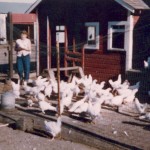
My brother and I didn’t mind the cattle and hog manure. Each had its own aroma and for farm kids both were tolerable. Now, chicken manure was in a category by itself. Chicken manure didn’t have an aroma, it had an odor, an odor of ammonia. Not the odor of household cleaning ammonia but one hundred times worse. The stench that made you feel this breath could be your last. The deeper the manure, the more ammonia odor. A long winter meant a hold-your-breath job of cleaning the chicken house. This was one of those springs.
My dad, my brother, and I would each have a four tine pitch fork. Each would gather up a fork load, walk across the chicken house, through the one man door, and deposit the load in the manure spreader. My Dad was a stickler for efficiency. Keeping the proper rhythm and steps were required so there was no standing still time and no one waiting to get through the one man door. Our motions were a carefully crafted routine that would make a choreographer proud.
On this day, we were about half done. We no longer sucked in a big breath outside the chicken house and held it as we gather a fork load and returning to the outdoors. The ammonia odor was subsiding. Dad was returning from the field where he spread the manure. We were expected to have forks full of manure and ready for the spreader; the second dad backed the spreader into place by the door.
Gale and I loaded our forks and walked toward the door with me leading the way. Dad had miscalculated backing up the spreader, a rare occurrence, and had to make a second attempt. I paused in the doorway. Gale, being behind me, could not see what was happening. Those fork loads of chicken manure were heavy. He told me to hurry up. I don’t recall what I said, but it was probably some snide remark. I didn’t actually see it, but I know that’s when Gale’s eyes lit up, and he smiled his devilish smile. He had his chance to get even for those stitches in his leg.
Gale stabbed me in both buttocks with his four tine pitchfork loaded with fresh chicken manure reeking of ammonia. I yelled and jumped, but I didn’t drop my pitch fork load of manure. I had learned a good deal of profanity from my Dad’s cousin, and I used most of it.
Dad had parked the manure spreader and was coming through the door. He responded with “What the hell’s going on with you two.” Gale and I had heard that statement often. I said Gale stabbed me in the butt with the pitch fork. Dad looked at Gale. Yep, Gale was still holding the pitch fork load of aged chicken manure. He had his unapologetic look on his face.
Dad took down my pants. There were puncture wounds. It was off to the house for mom to look at and clean. After her inspection, the next stop was the doctor’s office. I became the recipient of another tetanus shot. I remember other shots and the sting of another cleansing of the punctures. When we left the doctor’s office, I was “good as new” according to my Dad; no stitches and no bandages. The punctures didn’t affect my ability to sit or walk so it was back to work. Unless you were dead, dad believed you should be working.
Gale and I got another familiar warning “don’t do that again.” We followed that warning. There were so many new opportunities we didn’t have to repeat our previous encounters.
We finished cleaning the chicken house and filled it with fresh straw. The place actually smelled good. Everybody was happy. Dad was happy we could all keep working. Mom was happy to have a clean chicken house. Gale got even for his stitches and had that devilish smile he was noted for. And me, well I just had a sore butt for a few days. I was happy I didn’t have to go back to the doctor in a few days and get stitches out like he did.

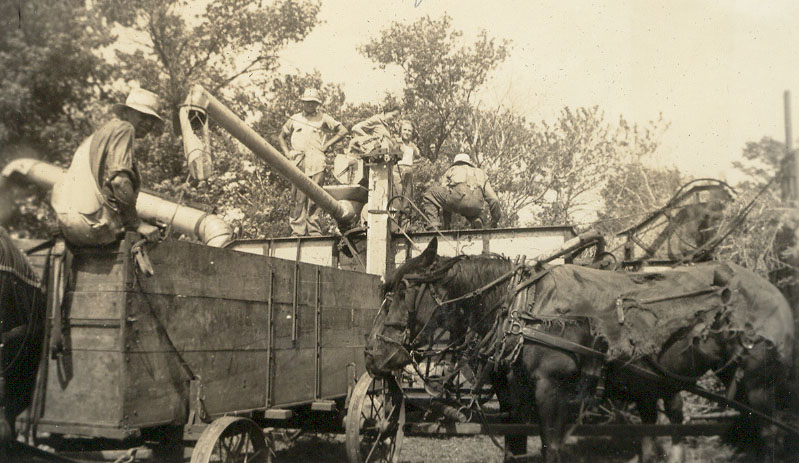

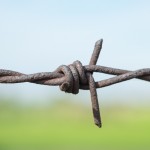 Stitches
Stitches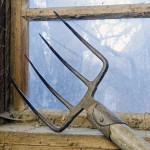 Gett’n Even
Gett’n Even